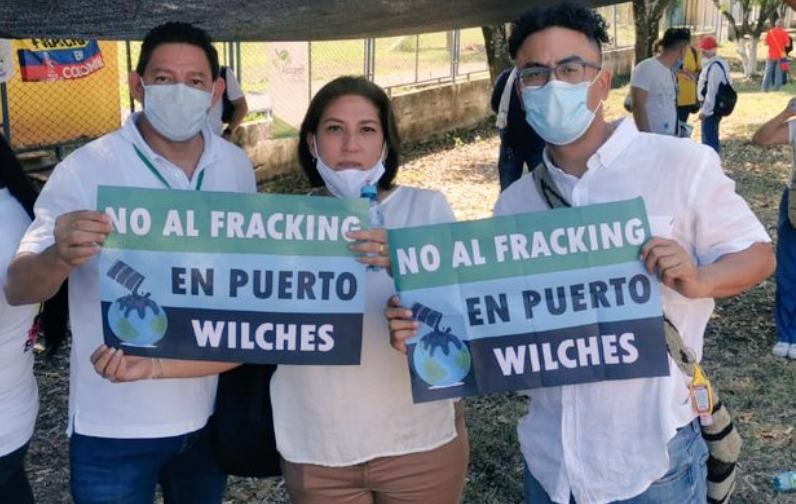Article by PBI-Canada

On February 24, the president of the Colombian state oil company Ecopetrol, Felipe Bayón, and other executives updated investors on fracking in Colombia.
Here is an overview to understand the context of his update yesterday:
Protests against fracking in Puerto Wilches
The first license for a fracking pilot project in Colombia was awarded by the National Hydrocarbons Agency (ANH) to Ecopetrol on November 25, 2020, for its Kalé project near the community of Puerto Wilches, Santander.
Hundreds of people in Puerto Wilches protested against this pilot project on December 13 and then again on February 10 of this year.
Blu Radio reports: “[The fracking pilot project] provoked protests from social organizations that say the pilot does not have a social license because it will affect the biodiversity of the area, especially the wetlands [ciénagas] of Paredes and Yariguí, in addition to the damage it will cause in species such as the manatee, which is endangered.”
This recent Oil Barometer poll found that 69 percent of people in Puerto Wilches oppose fracking and that 73 percent of Colombians are opposed to fracking.
Threats against social leaders opposed to fracking
Reuters also reports: “Environmentalists have called for the project to be suspended after threats against anti-fracking activists.”
Bayón says: “We emphatically reject those threats. We have said this is an exercise where everyone has to have an opinion.”
Despite this assurance from the oil company president, the reality remains that 177 human rights defenders were murdered in Colombia last year. And in 2019, 64 land and environmental defenders were killed in Colombia.
7 billion barrels of oil in Puerto Wilches
Oilprice.com has previously reported that Ecopetrol estimates that Colombia may have up to 12 billion barrels of recoverable shale oil. Valora Analitik now reports that Bayón says there may be up to 7,000 million (7 billion) barrels of oil in the pilot area.
Council of State scheduled to meet on March 11
The Valora Analitik article also notes: “Bayón explained that on March 11, the State Council [the supreme judicial tribunal with jurisdiction over administrative issues in Colombia] will begin the discussion on the regulation of fracking ‘which will take several months.’ But, he said, the regulation of the pilots is in force and they will continue.”
Caracol Radio adds: “Juan Pablo Sarmiento leading environmentalist of the Santanderes [the department/province of Santander where Puerto Wilches is located] who participated in establishing this process [at the Council of State, says] groundwater pollution is very risky and this type of extraction should be avoided.”
Baseline measurements have now started in Puerto Wilches
Blu Radio reports that Ecopetrol has now set up three air monitoring stations in Puerto Wilches that will measure air conditions there for the next three months to get baseline readings before the Kale fracking pilot project begins.
Three months takes us to about the beginning of June.
Fracking to begin by the end of 2021
Valora Analitik adds: “Bayón confirmed what was said yesterday in that for that pilot he hopes to have the licence by the end of 2021 and to be able to start with the activity in the area as soon as that happens.”
Three more fracking pilot projects to be awarded on March 30
BNAmericas has reported that four companies have prequalified for a second round of licensing for fracking pilot projects in Colombia: ExxonMobil (in partnership with Toronto-based Sintana Energy), Ecopetrol, Drummond, and Tecpetrol.
That article notes: “ANH [the National Hydrocarbons Agency] has said it hopes to award an additional three contracts in the second round, which will include acreage in the Cesar Ranchería and Middle Magdalena Valley basins.”
UN Special Rapporteurs and human rights concerns
On January 29, United Nations Special Rapporteur on human rights and the environment David Boyd called on the House of Representatives in Colombia to prohibit fracking. Boyd stated: “In light of its obligations under constitutional, international, human rights and environmental law, fossil fuels must be replaced by renewable energies.”
Then on February 12, UN Special Rapporteur on toxic substances and human rights Marcos Orellana stated: “New investments in this field are incompatible with the protection of human rights. This, because fracking generates toxic pollution, which threatens life, health, and ecosystems; aggravates the planetary emergency and climate change; it violates the right to live in a healthy environment and undermines sustainable development.”
PBI accompaniment
In November 2019, Peace Brigades International hosted an advocacy tour in Canada with representatives from the human rights organizations CREDHOS and CCALCP.
We continue to amplify their concerns about fracking, the risks faced by environmental defenders, and monitor the human rights implications of fracking in Colombia.

